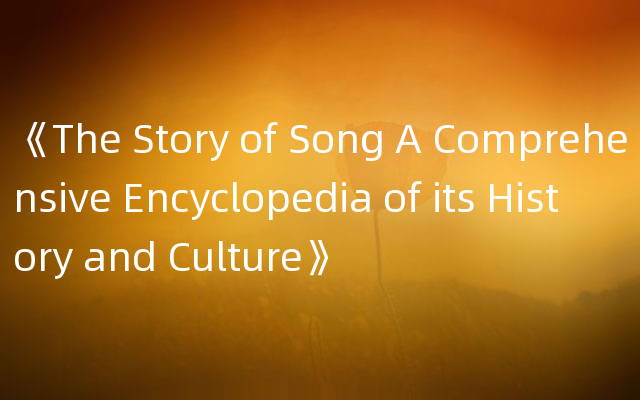
《The Story of Song: A Comprehensive Encyclopedia of its History and Culture》
Song, also known as the \"River of Heaven,\" is a place where countless heroes and beliefs have emerged in the long river of history. It is a place where the Chinese civilization blossomed and flourished, and its cultural heritage remains an important part of the world heritage today. In this encyclopedia, we will take a comprehensive look at the history and culture of Song, from its origins to its present, covering every aspect of its development.
Geography
The Song Dynasty (960-1279) was located in the middle and lower reaches of the Yangtze River, and its capital was situated in modern-day Kaifeng City, Henan Province. The empire was bordered by the Liao and Jin Dynasties to the north, the Western Xia to the west, and the Southern Tang Kingdom to the south. With its central location, the Song Dynasty played a pivotal role in China's economy, culture, and politics.
History
The Song Dynasty was divided into two periods, the Northern Song (960-1127) and the Southern Song (1127-1279). The Northern Song was a time of stability and prosperity, while the Southern Song was a period marked by wars and political turmoil. Despite the challenges, the Song Dynasty produced many remarkable achievements in art, science, literature, and technology.
Art
Song art was characterized by simplicity, elegance, and technical proficiency. Landscape painting was particularly popular during this time, with artists portraying the natural beauty of the mountains and rivers with delicate brushstrokes and ink washes. The Song Dynasty also witnessed the development of porcelain-making, with beautiful celadon, white porcelain, and blue-and-white porcelain being produced.
Science
The Song Dynasty made significant advancements in science and technology. The most famous invention was gunpowder, which was originally used for fireworks but later made its mark on warfare. The Chinese also developed the magnetic compass, which revolutionized navigation and made long-distance sea travel possible. In addition, the Song Dynasty made strides in agriculture, with new irrigation techniques and the creation of the Champa rice strain, which allowed for increased food production.
Literature
The Song Dynasty is considered a golden age of Chinese literature, with many notable writers and poets emerging during this time. Some of the most famous works include the novels Outlaws of the Marsh and Journey to the West, as well as the poetry of Su Shi and Li Qingzhao.
Culture
Song culture was influenced by the Confucian ideals of respect for tradition and learning. The civil service examination system, which allowed talented individuals to become government officials based on their exam results, played a major role in promoting education and encouraging social mobility. Popular forms of entertainment included opera, acrobatics, and storytelling.
Legacy
The Song Dynasty may have been short-lived, but its legacy remains an integral part of Chinese culture. Its art, science, literature, and culture have had a significant impact on the world and continue to inspire people today. Through this encyclopedia, we hope to provide a comprehensive understanding and appreciation of the rich history and culture of Song.

